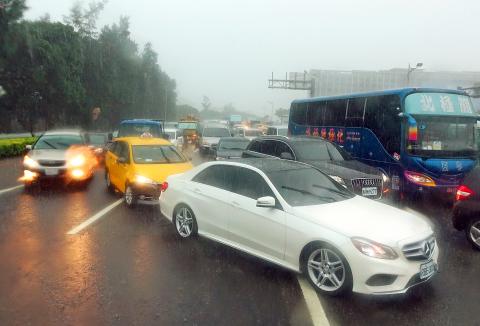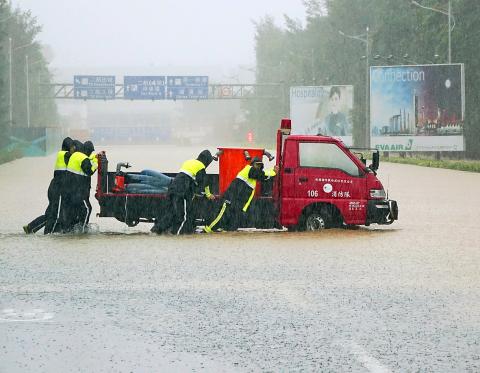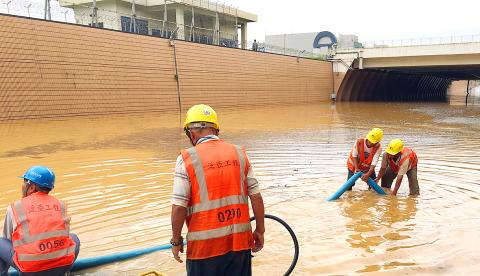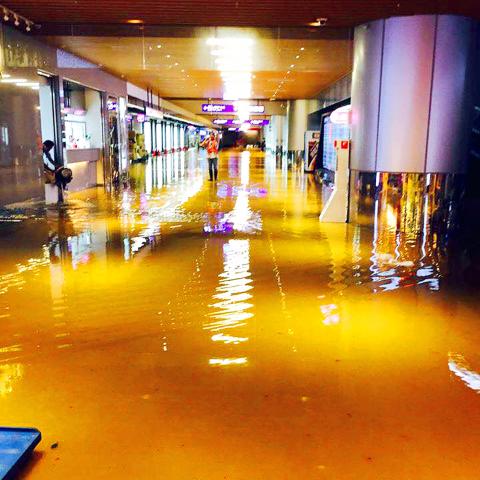Extremely heavy rainfall brought by a frontal system pummeled northern Taiwan yesterday morning, severely disrupting operations at Taiwan Taoyuan International Airport and affecting more than 200 flights.
The Ministry of Transportation and Communications said that the thunderstorms, which lasted for more than two hours, as well as overflow from the Pusin River (埔心溪), had caused flooding at the two traffic underpasses leading to the airport terminals.
Because of the flooding in the underpasses, motorists traveling to and from the airport were asked to use Provincial Highway No. 4, rather than the usual route, Freeway No. 2.

Photo: Chu Pei-hsiung, Taipei Times
Rainwater also leaked through the ceiling of Terminal Two and caused flooding in its underground food court.
Air navigation facilities on Datunshan (大屯山), in Taipei’s Beitou District (北投), which are used to guide air traffic into the airport, were also affected by the thunderstorms, forcing Air Navigation and Weather Services to activate a backup system in order to continue with air traffic control procedures.
By 1:30pm, 88 flights arriving at the airport and 131 departure flights had been affected by the weather, including two flights that were forced to land at airports in Kaohsiung and Taichung.

Photo: Chu Pei-hsiung, Taipei Times
After pumping out the floodwater, the airport reopened its main access routes at 6:13pm.
Passengers were crowded in the lobby of Terminal Two last night due to a backlog of delayed flights and an incomplete resumption of the power supply inside the terminal.
In response to the worst flooding since the airport opened in 1979, Premier Lin Chuan (林全) ordered the ministry to identify the causes of the flooding, adding that it must also identify those who should be held accountable.

Photo: CNA
“Lin was upset, because the airport is the gateway of the nation, and the flood caused a lot of trouble to the public,” Executive Yuan spokesman Tung Chen-yuan (童振源) said. “The premier said that apparently there are serious problems with the construction [of the third terminal] at the airport, and asked the ministry to investigate — if there are human factors involved, then those people should be held responsible as well,” Tung said.
Deputy Minister of Transportation and Communications Wang Kwo-tsai (王國材) said that the ministry would deal with the issue of overflow from the Pusin River with assistance from the Water Resources Agency and the Taoyuan City Government.
He said that Taoyuan International Airport Corp (TIAC) needs to reinforce its ability to handle flooding at the airport, including the use of water pumps and power generators.

Photo: CNA, screengrab from Facebook
“TIAC must learn to coordinate with the Taoyuan City Government and its police department to facilitate access to the airport when flooding occurs,” Wang said.
The Taoyuan City Government dismissed claims from TIAC that the overflow from the Pusin River had clogged the airport’s drainage system with trash and tree branches.
However, Wang said that now is not the time to be looking for someone to blame.
“The most important thing is to solve the problem,” he said.
Wang said that 153mm of rain had poured into Taoyuan within three hours yesterday morning.
The Central Weather Bureau said that rainfall in Taoyuan yesterday morning accounted for about 8 percent of the city’s average annual rainfall, which is about 1,930mm.
The bureau said that the heavy rain was caused by a convection system, which moved slowly and caused heavy rainfall between 9:30am and 11:30am.
Additional Reporting by Loa Ioksin

SECURITY: As China is ‘reshaping’ Hong Kong’s population, Taiwan must raise the eligibility threshold for applications from Hong Kongers, Chiu Chui-cheng said When Hong Kong and Macau citizens apply for residency in Taiwan, it would be under a new category that includes a “national security observation period,” Mainland Affairs Council (MAC) Minister Chiu Chui-cheng (邱垂正) said yesterday. President William Lai (賴清德) on March 13 announced 17 strategies to counter China’s aggression toward Taiwan, including incorporating national security considerations into the review process for residency applications from Hong Kong and Macau citizens. The situation in Hong Kong is constantly changing, Chiu said to media yesterday on the sidelines of the Taipei Technology Run hosted by the Taipei Neihu Technology Park Development Association. With

A US Marine Corps regiment equipped with Naval Strike Missiles (NSM) is set to participate in the upcoming Balikatan 25 exercise in the Luzon Strait, marking the system’s first-ever deployment in the Philippines. US and Philippine officials have separately confirmed that the Navy Marine Expeditionary Ship Interdiction System (NMESIS) — the mobile launch platform for the Naval Strike Missile — would take part in the joint exercise. The missiles are being deployed to “a strategic first island chain chokepoint” in the waters between Taiwan proper and the Philippines, US-based Naval News reported. “The Luzon Strait and Bashi Channel represent a critical access

‘FORM OF PROTEST’: The German Institute Taipei said it was ‘shocked’ to see Nazi symbolism used in connection with political aims as it condemned the incident Sung Chien-liang (宋建樑), who led efforts to recall Democratic Progressive Party (DPP) Legislator Lee Kun-cheng (李坤城), was released on bail of NT$80,000 yesterday amid an outcry over a Nazi armband he wore to questioning the night before. Sung arrived at the New Taipei City District Prosecutors’ Office for questioning in a recall petition forgery case on Tuesday night wearing a red armband bearing a swastika, carrying a copy of Adolf Hitler’s Mein Kampf and giving a Nazi salute. Sung left the building at 1:15am without the armband and apparently covering the book with a coat. This is a serious international scandal and Chinese

COUNTERINTELLIGENCE TRAINING: The ministry said 87.5 percent of the apprehended Chinese agents were reported by service members they tried to lure into becoming spies Taiwanese organized crime, illegal money lenders, temples and civic groups are complicit in Beijing’s infiltration of the armed forces, the Ministry of National Defense (MND) said in a report yesterday. Retired service members who had been turned to Beijing’s cause mainly relied on those channels to infiltrate the Taiwanese military, according to the report to be submitted to lawmakers ahead of tomorrow’s hearing on Chinese espionage in the military. Chinese intelligence typically used blackmail, Internet-based communications, bribery or debts to loan sharks to leverage active service personnel to do its bidding, it said. China’s main goals are to collect intelligence, and develop a